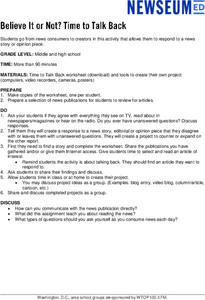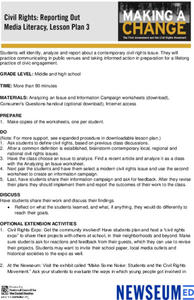Franklin D. Roosevelt Presidential Library & Museum
Pearl Harbor Activity #4: Who is the Audience?
Young historians use the prompts on a worksheet to analyze President Roosevelt's "Day of Infamy" speech. They identify the intended audience for the speech, the devices FDR used to persuade his audience, the responses promoted, and the...
Franklin D. Roosevelt Presidential Library & Museum
Pearl Harbor Activity #2: Why Do Words Matter?
Words matter! That's the big idea behind an activity that asks scholars to replace words in FDR's "Day of Infamy" speech with synonyms. They then listen to a recording of President Roosevelt's address and compare his version to their own.
Newseum
Civil Rights: Turning Points
As part of a civil rights movement study, groups select an event from an interactive timeline that they feel marks a turning point in the struggle. After collecting evidence to support their choice, the teams develop a multimedia...
Newseum
Free Press Challenges Through History: Analyzing Historical Sources
The debate over the integrity of stories in media is not new. Young journalists analyze historical sources that reveal freedom of the press controversies and draw parallels to challenges freedom of the press faces today.
Newseum
Persuasion Portfolios
After class members brainstorm a list of current social and political issues, groups each select a different topic from the list to research. Teams create a portfolio of at least 10 examples of stories about their issue, stories that...
Newseum
Covering a Catastrophe: Press Conference Simulation
Young journalists have an opportunity to experience the challenges of covering a catastrophe by staging a mock press conference. Half the class acts as reporters while the others act as officials from the mayor's office.
Newseum
Civil Rights: Knowns and Unknowns
Class members generate a list of research questions to review the civil rights movement and determine what scholars still need to learn. Groups then select a different compelling question, create a hypothesis and find evidence to support...
Newseum
Before and After: Analyzing Turning Points in History
Scholars examine front-page news stories to gather evidence about significant historical events. They hypothesize how these events changed people's lives who lived through them and how they continue to impact lives today.
Newseum
Is This Story Share-Worthy?
Young journalists use a "Is This Story Share-Worthy?" flowchart graphic to decide whether a story is worth sharing online. Instructors provide groups with fake news, poor quality stories, opinion pieces, biased news, and high-quality...
Newseum
Making a Change: Letter From Birmingham Jail
Martin Luther King Jr.'s "Letter From Birmingham Jail" was written in response to "A Call for Unity," written by eight white ministers from Birmingham and published in the local newspaper. After reading both letters and following a list...
Newseum
Confronting Conformation Bias
Be curious! Seek out different opinions! Be conscious of your thinking process! After reading an article about confirmation bias and motivated reasoning, class members apply these strategies to the topic of school start times. They read...
Newseum
Believe It or Not? Time to Talk Back
Young journalists select a news story, editorial, or opinion piece that they disagree with or one that leaves them with questions. They then create their report in response and share it with the class.
British Council
Love Poems
Language learners write down the words to a song as they listen to it. They then work in groups to write a love poem using the words and phrases they wrote from the song. As a culminating activity, scholars read their poems to the class.
British Council
Drawing Dictation
Scholars give drawing dictations to practice using prepositions of place correctly. They work in groups, taking turn dictating and drawing. Learners then receive a picture they have not seen and write directions to accompany the image.
British Council
Online Safety for Teenagers
Safety in a cyber world is complex but important. Scholars review ways to stay safe online by first writing words given by the teacher. Learners analyze the words to guess the topic of the lesson plan. They then read an online safety...
British Council
The Months of the Year
What month is it? Scholars work with a team and play a game to guess which month is described by given clues. While playing, pupils learn more about what makes each month different with a main focus being on the weather.
British Council
An English Action Plan
Language learners discuss ways they can increase their use of English in the new year and brainstorm with peers ideas to practice language. Scholars finish by completing a worksheet to create their own English Action Plans to increase...
British Council
Plastic-Free Is Not Easy
Paper or plastic? Scholars discuss a worksheet containing grocery photos in which consumers were challenged to buy items without plastic wrapping or containers. Learners rank the food items by the need for packaging, such as a banana,...
Newseum
Things Change, Things Stay the Same
Securing women the right to vote was a long time coming. Over the years, some aspects of the suffrage movement changed, and some things remained the same. Pupils research three time periods and collect evidence of key people, strategies,...
Texas Education Agency (TEA)
Proofreading
Where's the proof? Using the resource, scholars learn proofreading marks and complete a series of worksheets to practice using them correctly. Then, they make intentional errors to a writing passage before switching with a partner to...
British Council
Buy. Use. Toss.
Responsible consumption is never a waste of time. Using the engaging resource, scholars learn about the impact of waste on the planet, sorting trash into necessary and luxury piles. They then analyze their consumption habits, writing an...
British Council
Chocolate
Are you the biggest chocoholic? Scholars read text about people eating chocolate and sequence the text by putting them in order of who ate the most to least chocolate. They quiz classmates to discover who is the biggest chocoholic in the...
Newseum
Propaganda Through History: Analyzing Historical Sources
Working in teams, pairs, or individually, scholars select one resource from a gallery of historical sources and consider which examples might be considered propaganda, the techniques used to persuade audiences, and evaluate how the...
Newseum
Civil Rights: Reporting Out
After brainstorming a list of contemporary local, regional, and national civil rights issues, pairs of scholars select one of these issues and design an information campaign to spread awareness of the issue.

























